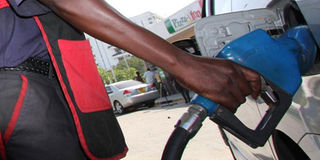Diesel is most adulterated petroleum product - UNBS

Fuel adulteration remains a challenge, which UNBS says is seeking to eliminate. PHOTO/FILE
What you need to know:
- The adulteration, therefore, UNBS said, calls for caution among consumers even as there have been efforts to completely wipe it out.
Diesel is the most adulterated (diluted) fuel in Uganda, according to Uganda National Bureau of Standard (UNBS).
The adulteration, therefore, UNBS said, calls for caution among consumers even as there have been efforts to completely wipe it out.
Speaking during an event organised by Vivo Energy to unveil a series of activities, Mr Peter Kitembo, the UNBS head of petroleum testing laboratory, said adulteration, dumping and smuggling of fuel products presents serious challenges for the environment, engine performance and tax loss.
“The most adulterated fuel in Uganda is diesel. Much of this is adulterated on its way into the country,” he said, noting that fuel is one of the fastest moving commodities, which require a self-regulatory approach to ensure quality and safety of the product.
The petroleum products sector, among which includes fuel, liquefied gas and bulk illuminating kerosene, had until 1999 been not subjected to any testing, which saw an increase in dumping and adulteration.
However, in 1999, testing programmes were introduced and a fuel marking programme under UNBS was subsequently established in 2007 due to rampant adulteration.
Uganda, according to data from the Energy Ministry, consumes about six million litres of fuel per day, which amounts to 162 million litres per month. Demand has, since 2018, been growing at 7 per cent per annum.
Diesel, which has an average consumption of 50 million litres per month, is the most consumed petroleum product, mainly used for heavy industrial activity and motoring.
Petrol has a monthly consumption of about 40 million litres while kerosene and jet fuel have a consumption rate of 28 million litres and seven million litres per month, respectively.
Mr Kitembo said UNBS has continued to put in place quality control measures with the establishment of a testing laboratory, which checks the quality of fuel coming through Malaba, Busia and Mutukula border points.
“Every fuel product coming into Uganda is quality marked at the border … we are able to monitor 90 per cent of the station with mobile testing. We have stepped up testing of fuel by subjecting all station to provide result of the fuel they have tested every day,” he said.
There are about 2,916 petrol stations (retail dealers) spread in different parts of the country, according to UNBS.
Mr Kitembo also said efforts were underway to harmonise fuel standards across East Africa with the aim of ensuring quality and high standards of fuel among regional member states.
There are also efforts, according to UNBS, to harmonise standards for liquefied petroleum gas and Bulk Illuminating Kerosene, also known as BIK, among others.
Investing in quality
During the same function at which Shell launched a series of activities, among which included celebrating an ISO certification, Mr Gilbert Assi, the Vivo Energy managing director, said the company had invested heavily in quality specification, which “is a confirmation of our ability to conduct correct, variable and replicable test results at our laboratory”.
“Customers can be assured that the products at any of our service stations [Shell] meet the same quality as what is sold in international markets,” he said.




